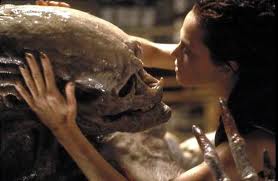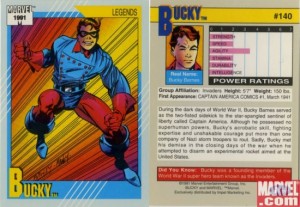The Avengers is out, and by now everyone knows it’s awesome. Writer/director Joss Whedon has been getting a lot of credit for that, but he’s also such a divisive figure among movie geeks that I think some people who are not fans of his prior work are already starting to underestimate his contribution, and that, for the purposes of this blog, I cannot abide.
Don’t get me wrong, I get why this movie could look like a gimme, particularly in retrospect. The guy was handed THE most well established superhero property in the world, with several other films having done the heavy lifting of establishing all the main players, so how much is there to do? On the directing side, provide some serviceable action scenes and stay out of the actors way, because it cannot be overstated how top-to-bottom impeccable the casting of every role in these movies has been. And that cast, most glaringly Robert Downey Jr, make it seem like there’s not a ton of writing to be done either. Plug in characters XYZ, give them some aliens to punch, call it a day. And I guess layer in a bunch of pop culture references while you’re at it, since you are Joss Whedon after all.
And I can see how folks could walk out thinking that’s all he did. But it’s not. So much of what is perfect about The Avengers script seems natural and obvious on screen, because that’s how most great writing works. And that’s what I want to draw Whedon fans’ and especially detractors’ attention to, because the fundamental criticism of his style is that it feels transparently written in a way that turns off many people (see also: Smith, Kevin and Cody, Diablo, neither of whom is half the writer Whedon is in my opinion). Hell, maybe some people still felt that way about the dialogue in this movie, though I felt the superfluously stacked cast delivered even the more writerly quips with charm and ease. But I’m not talking about that, I’m talking about what’s going on under the hood that makes this movie hum along smoothly and naturally as it serves a dozen masters simultaneously. The stuff that is easy to take for granted but far from easy.
The most obvious example of the many masters is that there are either 6 or 7 heroes to service, depending on whether you count den mother Nick Fury, with no clear lead. The simplest way to deal with this would be to promote one, probably team leader Captain America or breakout character Iron Man, to de facto protagonist and make it their movie. Whedon doesn’t do this, because he really gets ensembles the way few writers do.
Lots of reviews have rightly praised the film for balancing things between the heroes so well, but I’m not just talking about giving every one roughly the same amount of screentime or Hawkeye action beats that don’t seem totally insignificant next to Thor’s. The script does that, which is great, but it also gives everyone a personal investment in the conflict. And this is important, because there simply isn’t time for everyone to have a full character arc (I’d say only Iron Man and Banner even approximate one), not to mention how the nature of this as a team-up film necessitates that the really significant bits of character development be reserved for the various solo franchises Marvel has going (otherwise why even keep them going after this?). There are 2 things in particular that the script does that give each hero a distinct reason to really care about thrashing the mob of faceless aliens at the end.
The first is the death of Agent Coulson – or more accurately, the handling of Coulson prior to his death. One of the most baffling criticisms of Whedon’s writing I’ve encountered is that he routinely kills off likeable characters in “shocking” fashion. I don’t see this as a negative, particularly in the context of a Marvel superhero film where business and tradition dictate that no one of consequence will ever die, at least not permanently. But some people seem to regard it as a crutch, a “cheap” way of generating pathos and surprise. I see it as anything but, since a crutch is supposed to make things easier on you, and losing a character you have spent time and effort building up investment in strikes me as a steep price to pay for something as fleeting as shock value.
Not that Coulson’s death was a total shock. It received gasps throughout the theater at my screening, but it was also being called out as inevitable by people familiar with Whedon’s work months in advance. It should be noted that this was easy to foresee less because his plotting is so rote than because the strictures Marvel put in place were so broad and obvious. When people talk about the typical “Whedon death,” they generally reserve the label for characters less ancillary than Coulson, but since this was not an original property, the top 7 main characters were clearly going to be off-limits to protect any shred of spin-off potential. There is exactly one sympathetic, original character that the audience has any investment in, so there is exactly one person who could possibly draw the short straw.
But even disregarding the writer’s history or the studio’s enormous interest in franchise protection and all other information about matters outside of the film itself, Coulson has to be the one to die. Fury practically breaks the 4th wall in explaining how the death galvanizes the team to finally work together, so I’m assuming everyone gets the basic idea there. But what other death would have an impact on everyone, including the audience? Let’s run down the characters and see how each would function as a sacrificial figure in a hypothetical world where Marvel was eager to off its biggest brand names:
Hawkeye – most of the characters don’t know him and audience has only really seen him as a bad guy. Who cares?
Black Widow – Thor has barely met her, Banner and Iron Man don’t really like her at this point in the 2nd act.
Fury – none of the non-SHIELD personnel really like or trust him anyway.
Maria Hill – no one but Fury seems to even know her name.
Thor – his relationship with these guys has so far been limited to trading a few punches with Iron Man and Cap.
Banner – you’d need a completely different take on this character to pull this off, as the fact that he CAN’T be killed is integral to this one, and killing him off before we even get a Hulk-out would cause riots.
Iron Man – this would devastate the audience, but his relationship with everyone but Banner has been contentious enough that it’s hard to imagine them all being moved to set aside their differences to avenge him (plus he doesn’t even know Thor or Hawkeye).
Captain America – This could almost work. He’s only just met most of these people, but they mostly seem to like him. Except Tony, who could still be shamed enough by his death to make it work, and Thor, who is essentially indifferent to everyone at this point but already has a personal stake in taking out Loki. The main problem is that you lose an action hero for the finale and no one else is as suited to take charge of the team at that point.
So, none of these works to motivate everyone. Even if they were feasible options from an off-screen perspective, no one of them provides the same balance of impact across all the Avengers. Coulson has a built-in connection to all his SHIELD colleagues (not that the movie relies much on this for their motivation). He also has history with both Iron Man and Thor from their solo movies, and Whedon is careful to give him scenes with each of them to remind us of that, as well as the wonderful bit of business where he is reduced to a sweaty-palmed fanboy in the presence of his hero, Captain America.
That these scenes exist at all is a sign that a capable screenwriter is at the helm, that they are so funny and economical without feeling forced or inorganic is where it borders on genius. Because each of these scenes balances the building of Coulson’s rapport with each character with other duties, which is what great writing does. The scene with Tony at the beginning provides us with exposition on the Avenger Initiative and why Tony was disqualified, which will be the basis of his character journey, and demonstrates through Pepper (representative of his better, less self-obsessed judgment) that while Tony treats Coulson much as a middle schooler would a hall monitor, it’s in a generally affectionate way. And of course it’s funny. The scene with Thor serves to reiterate his character development from his own movie, learning to care about the damage to the little people more than his personal glory, which is good for the character who drops the most gracelessly into these proceedings. And of course it’s funny. And the scene with Captain America underlines Cap’s man-out-of-time status as well as building up the “living legend” status that makes his taking charge of the final battle more believable. And, yeah, funny.
Balance is what makes this movie work, and Coulson’s position within it and across its predecessors allows his death to up the emotional stakes for the entire team and the audience simultaneously.
Some similar strategy is at work in the handling of Loki, which I’ll get into next.



